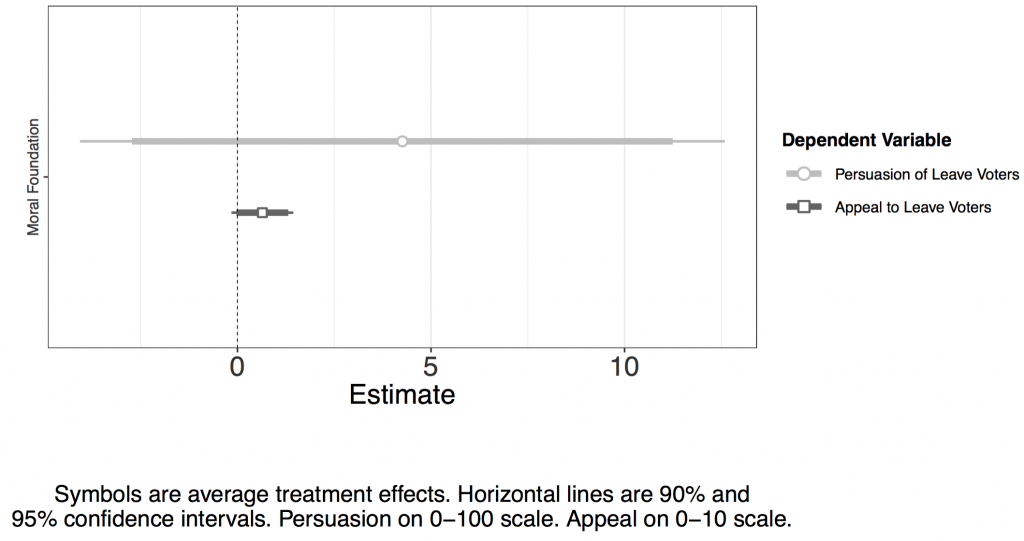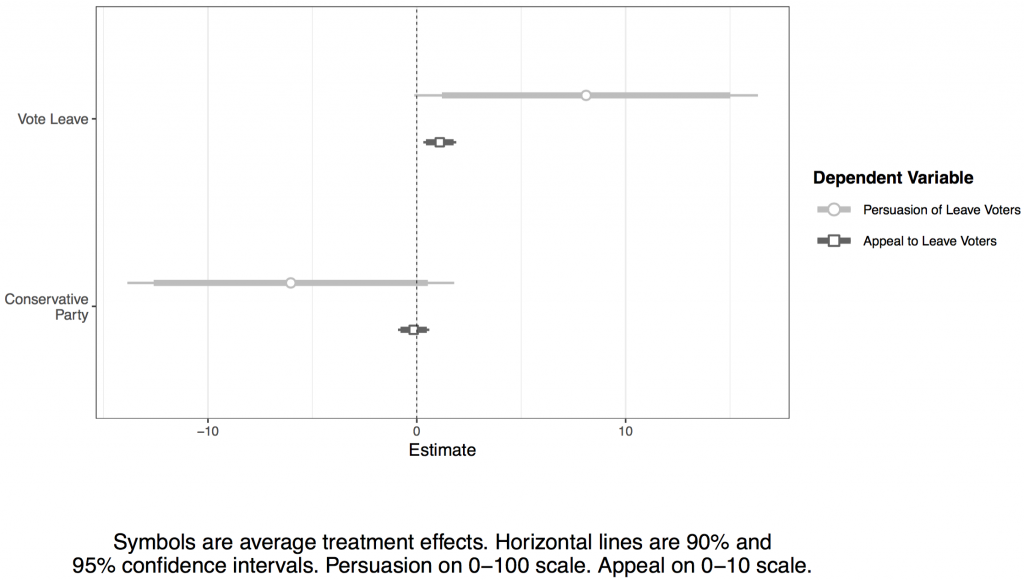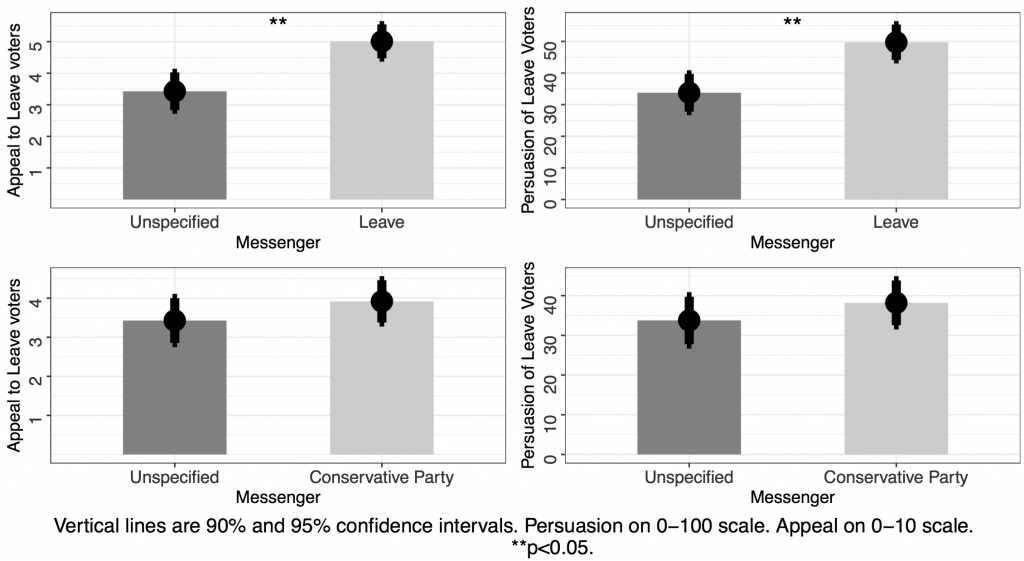Will Conservative Brexiteers back another referendum? If so, is it the nature of the argument that will persuade them or who makes it? Eitan Tzelgov and Delia Dumitrescu show that, although views on Brexit are based around moral issues, moral framing alone does not persuade these voters. What does seem to change their minds on a second referendum are moral arguments by Vote Leave.
Over the last three months, calls for a second EU referendum have become more prominent. Indeed, even arch-Brexiteers such as Nigel Farage and Arron Banks have toyed with the idea of a second vote. Most recently, London mayor Sadiq Khan called for another referendum, and the Labour party conference passed a motion backing the possibility of “people’s vote” on Brexit.
Amongst voters, opposition to a second referendum is strongest among Brexit supporting, Conservative Party voters, who hold right-leaning positions on immigration and nationalism. However, even among Brexiteers, frustration is mounting about the negotiations. Thus, although Brexit views are related to solidified positions, this lack of satisfaction can make a new referendum an enticing prospect not just for Remainers, but for Brexiteers as well. If that is the case, what type of arguments can cause conservative Brexiteers to change their position? Second, which political actors—in a political system so split over Brexit—can persuade them?
In new research, we use the case of the second referendum to test the limits of cue-taking, framing and persuasion effects, and the explanatory power of Moral Foundations Theory (MF). Since the Brexit debate has been framed around moral issues such as rightful authority and control, we examine the second referendum through the lens of moral framing. On the one hand, moral underpinnings may render the position on Brexit difficult to change. However, work in social psychology, based on MF theory, suggests that strongly held attitudes can change when people encounter messages using moral-based arguments.
In addition, since partisan endorsements are important heuristics individuals use in political decisions-making, we are also interested in their persuasion effects. Partisan endorsements are generally very strong. However, when the party is divided, the impact of partisan endorsement may be diminished. Given the ‘civil war’ amongst the Tories, can the party still provide voters with cues? And, if cohesion matters for cue-taking, what about non-parliamentary, more cohesive groups, like Vote Leave? The Brexit issue allows, therefore, for a rare examination of the comparative power of endorsements coming from two different sources: an internally-divided party, and a cross-partisan, yet ideologically united pressure group.
The study was designed to answer a number of specific questions. First, we wanted to test whether the issue of Brexit is grounded in moral values. Second, if that were the case, we were curious to learn whether the type of frame used in an argument in favour of a people’s vote mattered; specifically, is an argument framed around a conservative moral frame more persuasive in the eyes of Conservatives? Third, we were interested in the ‘messenger’ effect; are cohesive political organizations more persuasive than divided ones? And finally, we wanted to see whether there were ‘amplification’ effects, whereby morally based arguments advocated by cohesive political actors became more appealing to Conservative voters.
The first study was conducted on April 2018, and tests whether—as predicted by MF theory—British conservatives and liberals use different moral underpinnings to justify their Brexit vote (N=608). Our quantitative analysis of survey respondents’ answers relied on Linguistic Inquiry word Count and used the Moral Foundations dictionary. The analysis indicated that Conservative respondents use a distinct morally based language. Specifically, right leaning positions on the left-right scale, and positions on specific social issues are correlated with the use of authority (N=527). Our reading of conservative respondents’ answers reveals that in the context of the authority moral foundation, they use themes such as preference for national law-making and border controls.
At the next stage, we tested the persuasive power of moral arguments, as well as the importance of the endorsement source. We conducted an experiment employing a fully-randomized experimental design, whereby participants were randomly assigned to one of the six experimental groups.
We crafted two arguments, presenting different rationalizations for having a second referendum. The MF, authority-based argument, presented the vote as an instrument that would restore the authority of the British people. It was justified as a solution to the lack of accountability in the Brexit negotiations, and the reluctance of politicians to deliver on the result of the first referendum. Conversely, the information-based argument highlighted the political stalemate in parliament, and presented the second referendum as a way out of that situation. Manipulation tests ensured that the arguments were similar in terms of length, linguistic complexity, grammatical choices, and use of MF language.
The experiment was conducted from July 26th to July 30th. 630 ideologically conservative respondents, who had voted for the Conservative Party in 2017, and for Brexit in 2016, were recruited via the Prolific platform, and randomly assigned to one of the six experimental conditions. After reading the argument they were asked to estimate how appealing/persuasive the messages would be to Leave voters. We then regressed their answers on the various experimental conditions, and adjusted the average treatment effects by education, work status, sex, and age (N=585).
In Figure 1 we examine the persuasive effects of the MF-authority argument relative to the informative one, when neither is sponsored by a political actor. As can be seen, the persuasion/appeal effect is not statistically significant in either of the models. Thus, in the case of Brexit, morally-framed arguments do notseem to be especially convincing.
Figure 1: Average treatment effect of the moral (authority) argument
How does the identity of the messenger affect appeal/persuasion levels? The answer to this question is presented in Figure 2. The figure displays the average treatment effect for an informative message, sponsored by a political actor, relative to an unsponsored informative message. The results indicate that sponsorship by Conservative Party members is not more persuasive at all. In contrast, simply adding a Vote Leave sponsorship to an informative call for a second referendum causes the messages to be significantly more appealing/persuasive to Leave voters.
Figure 2: Average effect of message sponsors
Does a morally-framed argument become more persuasive if sponsored by a cohesive actor as well? The answer is yes. In Figure 3, we present the average predicted levels of persuasion/appeal, conditional on the message sponsor. While Vote Leave sponsorship significantly increases these levels among Leave voters, a sponsorship by Conservative Party members has virtually no effect.
Figure 3: Persuasion/Appeal average predicted values
The results are interesting for political scientists, as they indicate that old style politics, of the sort established by Campbel et al, may not be as important as in the past. In times where one-issue, cohesive, extreme political movements set the tone on major political issues, we may need to refine our understanding of cue-taking and party-driven motivated reasoning.
In terms of implications for British politics, the findings show that certain moral frames are pervasive in the way voters conceive of Brexit, which may explain the high levels of polarization over the issue. Interestingly, even though we find that Brexit positions are morally based, we fail to replicate persuasion effects from the MF literature; moral framing alone does not lead to persuasion. It could be that Brexit positions have become so entrenched that they cannot be altered by a simple, one-off treatment.
As for party politics, the results mirror the Conservative Party’s disarray over Brexit. The party is not seen as a leader on the matter, as is evident from the lack of any persuasion effects in cases where it sponsors a call for a referendum. In our experiment, Vote Leave, a pro-Brexit, cross-party organization—which hasn’t even been active since the referendum—has taken the party’s place in terms of leading voters to rethink their position. Whether this has any relevance to the likelihood of a people’s vote only time will tell. Ironically, the keys to holding another referendum in the near future may in fact be in the hands of those who advocated for a clean break in the first place, Vote Leave.
Eitan Tzelgov is Lecturer in Politics (Quantitative Methods) at the University of East Anglia
Delia Dumitrescu is Lecturer in Media and Cultural Politics at the University of East Anglia.
This post originally appeared on the LSE Blog.








